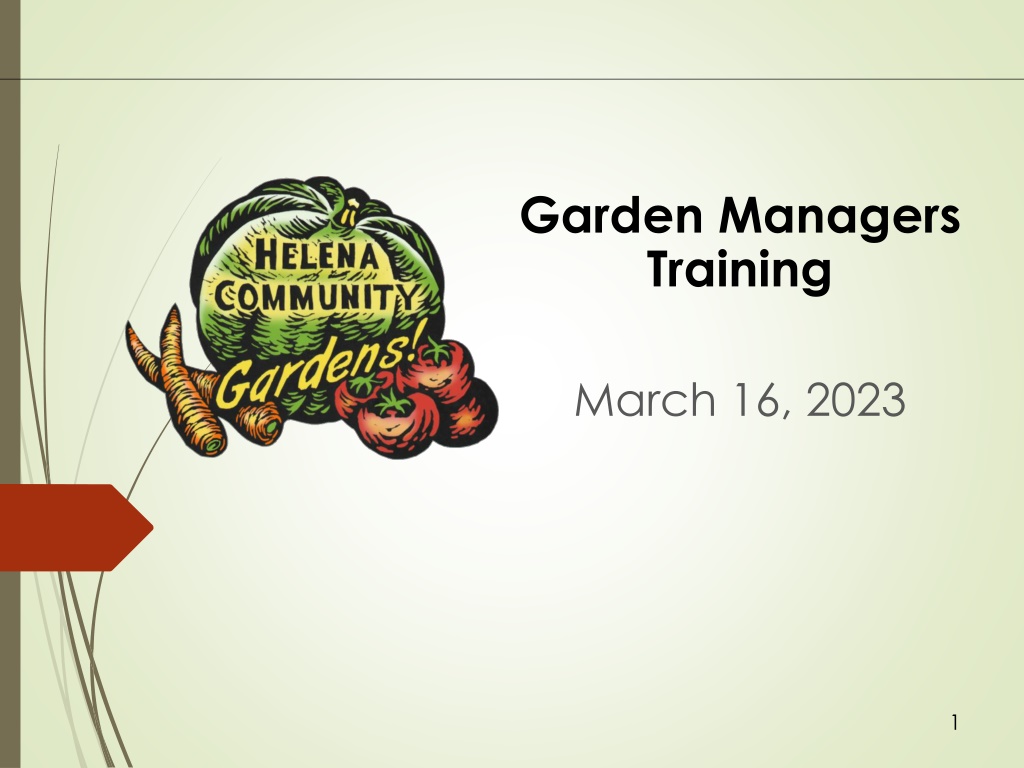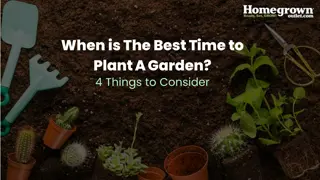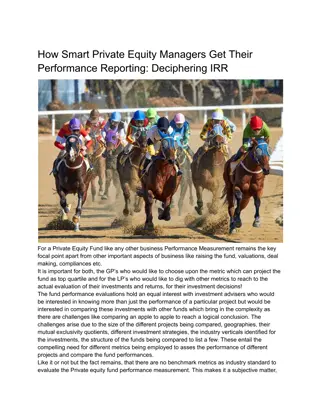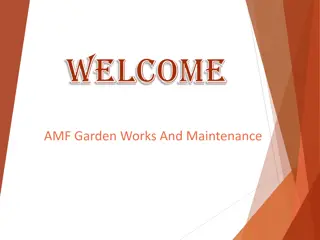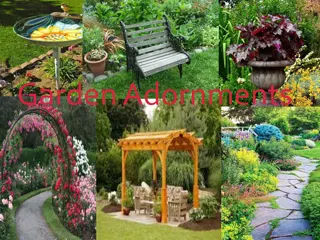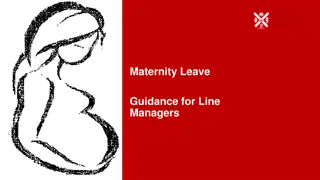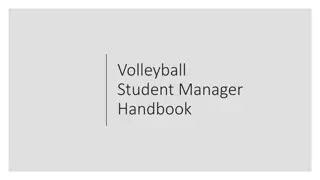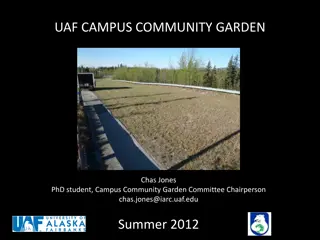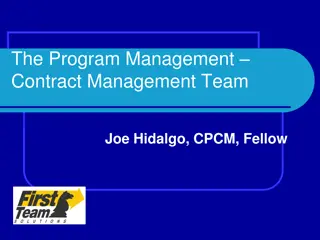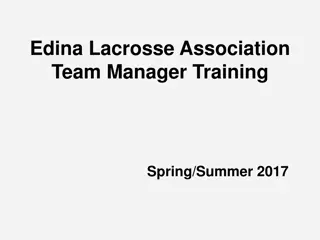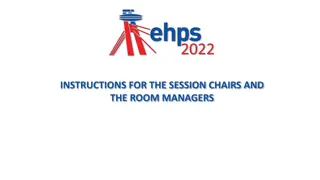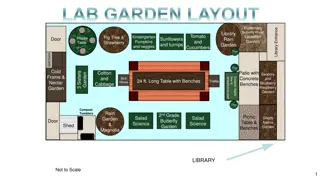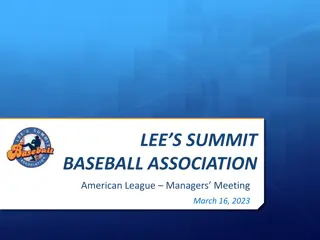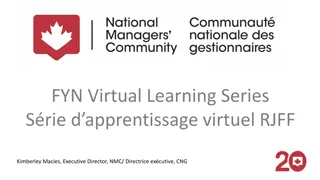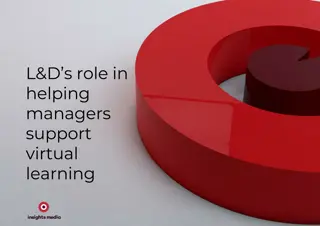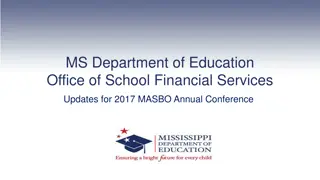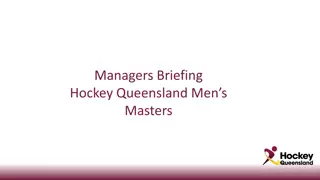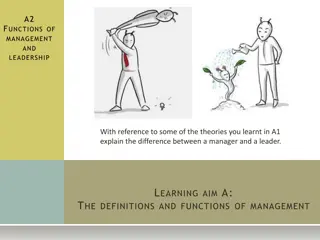Guidelines and Responsibilities for Garden Managers
This content outlines the roles and expectations of garden managers, covering areas such as attending meetings, maintenance responsibilities, conflict resolution, and benefits. Garden managers are required to participate in various activities, assist with plot sign-ups, manage conflicts, and propose garden improvements. Interpersonal responsibilities include addressing conflicts with plot holders and following the proper procedures for resolving issues. The document emphasizes the importance of communication, collaboration, and adherence to the organization's policies for effective garden management.
Download Presentation

Please find below an Image/Link to download the presentation.
The content on the website is provided AS IS for your information and personal use only. It may not be sold, licensed, or shared on other websites without obtaining consent from the author. Download presentation by click this link. If you encounter any issues during the download, it is possible that the publisher has removed the file from their server.
E N D
Presentation Transcript
Garden Managers Training March 16, 2023 1
HCG Organization and Structure Board of Directors Board Committees Executive Director (ED) Head Garden Manager (HGM) Garden Managers (GMs) 2
Expectations of Garden Managers Attend monthly GM meetings Assist with plot sign-ups Conduct pre-season garden meeting or meet with individual new gardeners o Review HCG policies and gardener s agreement 3
Expectations of Garden Managers Provide general maintenance at garden throughout season Report any major problems Coordinate volunteer activities for plot holders In the fall, submit budget/list of wants/needs for next season 4
Benefits to Garden Managers One free plot in garden managed Propose and manage any garden improvements Major improvements and grants must be submitted through the ED before being pursued and be approved by HCG Board 5
Interpersonal Responsibilities: Managing Problems and Conflicts Responsible for making first attempt to address/resolve problems/conflicts Notify offending plot holder and HGM of all infractions HGM will apprise the Board of the situation. Document problem, actions taken, outcome and/or further developments not resolved 6
Interpersonal Responsibilities: Managing Problems and Conflicts Seek assistance from HGM and/or ED and Board, if problem is not easily resolved In cases of water use violations, if a second violation occurs, in consultation with HGM, GM may confiscate offending hardware until end of season. 7
Interpersonal Responsibilities: Managing Problems and Conflicts GM can recommend to Board via the ED that habitual violators surrender plot Violators have right to appeal any decisions of GM to Board Refer to HCG Appeal Policy adopted September 2017 8
Interpersonal Responsibilities: Managing Problems and Conflicts Responsible for contacting emergency services or law enforcement Responsible for completion of formal incident reports 9
Interpersonal Responsibilities: External Establish at least one plot for produce donations to Food Share. Serve as ambassador to neighborhood and property owners surrounding community garden Work together address problems and concerns, scheduling events, etc. Make every effort to include neighbors at garden events 10
Interpersonal Responsibilities: External As time allows, GM may recruit, administer and coordinate outside volunteer groups. Must coordinate efforts through the HGM and ED. 11
Safety, Security and Access Contact information of gardeners with plots in HCG gardens is not for general distribution Always use "bcc" (blind copy) option when emailing your plot holders Do not distribute email addresses, phone numbers, etc. without permission of gardener 12
Safety, Security and Access Gate and shed locks Discretion of GM and gardeners whether to lock gates Tool sheds should be locked Notify HGM if locks are needed 13
Safety, Security and Access Identify and report to HGM any human, environmental, and physical hazards All hazards should be mitigated as soon as possible Anyone using motorized equipment (mowers, tillers, shredders, weed eaters, etc.) must wear proper safety gear Work to improve physical access to garden plots for all potential gardeners 14
Infrastructure, Tools, and Equipment Monitor physical condition of shared fencing, sheds, water systems, pathways etc. Maintain and repair as needed Notify HGM of any significant damages or other problems that you cannot repair 15
Infrastructure, Tools, and Equipment Shared tools and equipment Identify all shared tools and equipment colored tape Make sure all in good repair and available for all to use Attempt to limit misuse and pilferage 16
Infrastructure, Tools, and Equipment Power equipment - shredder, rototiller, mowers, weed whackers Inventory of power equipment at each garden If not available at your garden, contact HGM Annual maintenance requirements Shredder should not be used without proper instruction and safety equipment 17
Natural Resources: Water Water is one of HCG s largest expenses Water wastage is a serious problem and should be dealt with immediately; grounds for revoking plot Educate gardeners about appropriate conservation methods and monitor water use; Drip irrigation Soaker hoses Mulching Hand watering Watering in early morning or late evening Checking for leaks in drip lines or soaker hoses 18
Natural Resources: Water Violations: Unattended overhead sprinklers of any type (including overhead sprinklers on timers) Neglecting to repair excessive leaks in drip lines or soaker hoses within one week of notification Watering a garden plot belonging to someone else, unless given permission by plot holder 19
Natural Resources: Water Handling violators: Shut water off immediately Follow steps outlined in Managing Problems and Conflicts Refer to slides 6 8 and Section 4.a.i. (Garden Managers > Interpersonal Responsibilities) in the GM manual 20
Natural Resources: Soil and Organic Material Monitor soil fertility/conditions Soil testing Inexpensive May be of limited use in long- established gardens Bean test 21
Natural Resources: Soil and Organic Material Educate/encourage plot holders to use: Mulch/compost Co-cropping/cover cropping Proper methods of tillage Synthetic fertilizers are not allowed; use may be grounds for revoking plot 22
Natural Resources: Soil and Organic Material Composting All HCG gardens should have composting system Workshop on composting methods HCG owns one shredder Located at Waukesha 23
Weeds, Pests and Unwanted Crops HCG has a strict "organic only" policy.Gardeners observed using non-organic weed and pest control methods may have their plot revoked. 24
Pests Educate gardeners about organic control methods Physical removal or barriers Organic products Decrease over-wintering cover 25
Weeds Annual weeds Pull Prevent reseeding Cover crops Perennial weeds Bind weed Matrimony weed 26
Bind Weed https://www.gardencityharvest.org/the- real-dirt-garden-city-harvest- blog/2012/06/13/community-gardens- field-bindweed-convolvulus-arvensis http://ithacacommunitygardens.org/gar dening-resources/how-to-deal-with- bindweed-in-the-gardens https://midvalecommunitygarden.org/20 13/05/25/block-the-bindweed/ http://chelancommunitygardens.com/bi ndweed/ 27
Unwanted Crops Semi-flexible "annuals only" rule Perennials are generally discouraged 28
Neglected of Abused Plots Give plot holder two weeks notice to rectify the problem Notify the HGM If not resolved within 2 weeks, plot will be reallocated and plot fees will not be refunded 29
Unassigned Plot Protocol: Objectives Gardens kept in use for growing produce and weeds are managed Increase donations to Food Share Increase meaningful and long-term volunteer involvement Reduce workload on garden managers Gardens look attractive and can attract more plot rentals in subsequent years 30
Unassigned Plot Protocol Attempt to fill all plots from March May Send list of unassigned plots to ED by June 1st Empty Plot Team to manage as Food Share plot Plant seeds/starts, recruit/train volunteers, tend and harvest produce Or plot is covered to control weed growth 31
Seasonal Calendar: Spring Sign-ups new procedure Early sign-up for returning plot holders March 18 through March 31 Open sign-up starting April 1 June notify ED of unassigned plots 32
Fees and Agreements All plot holders, including those in church-owned plots, must sign Agreement Fees are paid on-line, but if needed, may be paid by check 33
Seasonal Calendar: Spring Conduct pre-season garden meeting Group or individual Check infrastructure and equipment Put up signs Let plot holders know water turn- on date 34
Seasonal Calendar: Summer Maintain garden complex, including signs, dumpsters/trash containers, fencing, etc. Notify HGM of any major problems Communicate with plot holders Email, posted notices, etc. Provide information about volunteer needs, opportunities, Food Share, events, work nights, etc. Organize volunteer events, as time allows 35
Seasonal Calendar: Fall Putting gardens to bed Notify gardeners to have plots cleaned-up by October 25th Remove dead plants and weeds Compost vs disposal bins OK to leave late-season plants in beds Notify gardeners when the water will be shut off Winterize water system as needed 36
Seasonal Calendar: Fall Plan group work day to clean-up garden complex (optional) Make needed repairs to garden complex (fences, beds, etc.) Service and winterize motorized equipment (tillers, shredders, etc.) Take down signs Summarize volunteer hours 37
Seasonal Calendar: Fall Submit list of next year s needs and budget to HGM and Treasurer by December 1st Submit end-of-year garden summary report by December 1st Template available for report 38
